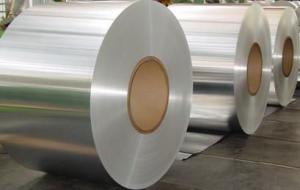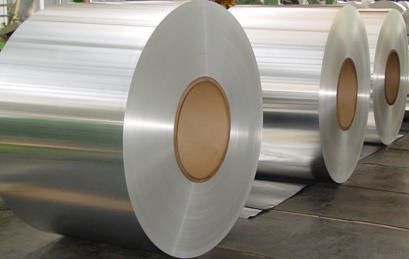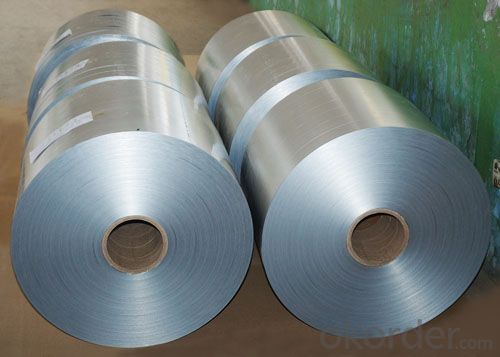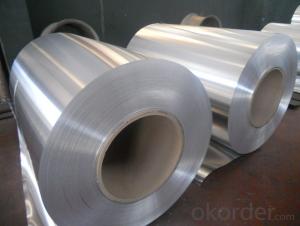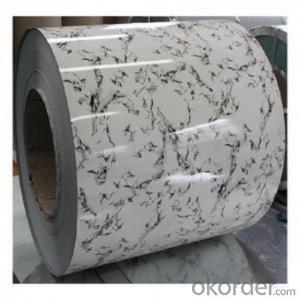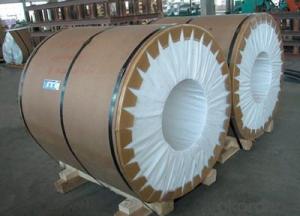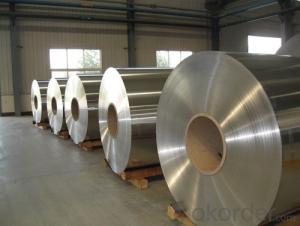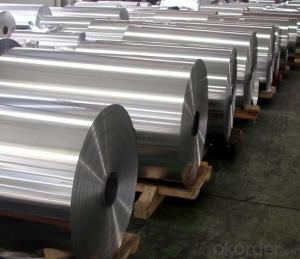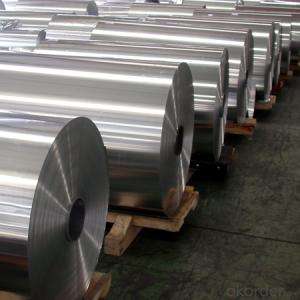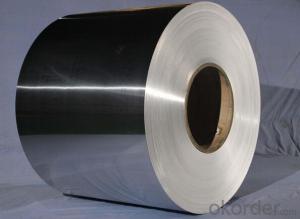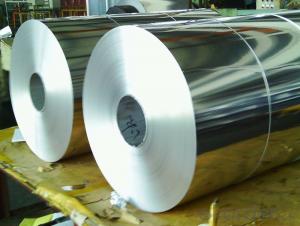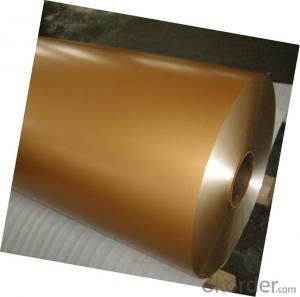6063 Alloy H22 Aluminum Rolled Sheet Aluminium Coil - Aluminum Coil Slitting Machine
- Loading Port:
- Shanghai
- Payment Terms:
- TT OR LC
- Min Order Qty:
- 5 m.t.
- Supply Capability:
- 500 m.t./month
OKorder Service Pledge
OKorder Financial Service
You Might Also Like
Specification
6063 Alloy H22 Aluminum Rolled Sheet Aluminium Coil
aluminum coil specifications:
1) Alloy :1050, 1060,1100, 3003 3004 3105 3A21 5005 5052 etc
2) Temper: O/H12/H14/H1/H18/H32/H34/H36/H38//H111/H112/H116/H321/T6/T651/T3/T351 etc
3) Thickness: 0.1mm to 6mm
4) Width:20mm to 3300mm
5)Coil weight: 100kgs to 6 tons depends on actual requirement
6)Core material: Aluminum or paper
7)Coil Inner diameter: 75mm, 150mm, 200mm, 300mm, 405mm, 505mm or as required
8) Protective film can be added
item | 3003 Aluminum coil | |
Standard | GB/T3190-2008,GB/T3880-2006,ASTM B209,JIS H4000-2006,etc | |
Material | 1060,1050,1100 3003,3103,3004,3005,3105 5052, 5454,5754 | |
Size | Thickness | 0.5mm-3.5mm |
Width | 800-1500mm | |
Weight/Roll | About 1.5MT/3MT | |
Quality control | Mill Test Certificate is supplied with shipment, Third Part Inspection is acceptable. | |
Surface | Bright, polished, hair line, brush, checkered, embossed, etc | |
Trade terms | Price term | ,FOB, CNF, CIF, etc |
Payment Term | TT,L/C | |
MOQ | 2MT | |
20 GP Capacity | About 20-25MT | |
Delivery time | 1.The products will delivery immediately after receiving the payment. 2.According to the order quantity, prompt delivery. | |
Export to | Ireland,Singapore,Indonesia,Ukraine,Spain,Canada,USA,Brazil,Thailand,Korea,Iran,India,Egypt,Kuwait, Oman,Viet Nam, South Africa, Dubai, Russia, etc | |
Package | Stick blue film→plastic film→waterproof paper→1~2 tons on a export standard pallet(corner protection) | |
Application | 1)Further making utensil.2)Solar reflective film3)The appearance of the building4)Interior decorating:ceilings,walls,etc.5)Furniture cabinets6)Elevator decoraction7)Signs,nameplate,bags making.8)Decoration inside and outside the car9)Household appliances:refrigerators,microwave ovens,audio equipment,etc.10)The consumer electronics:mobile phones,digital cameras,MP3,etc. | |
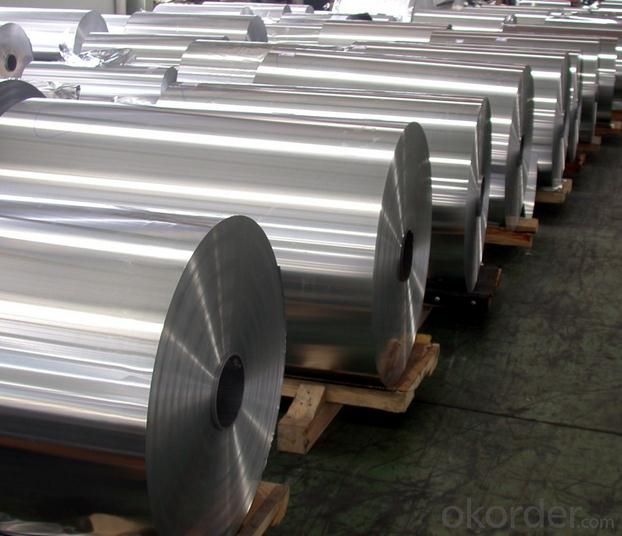
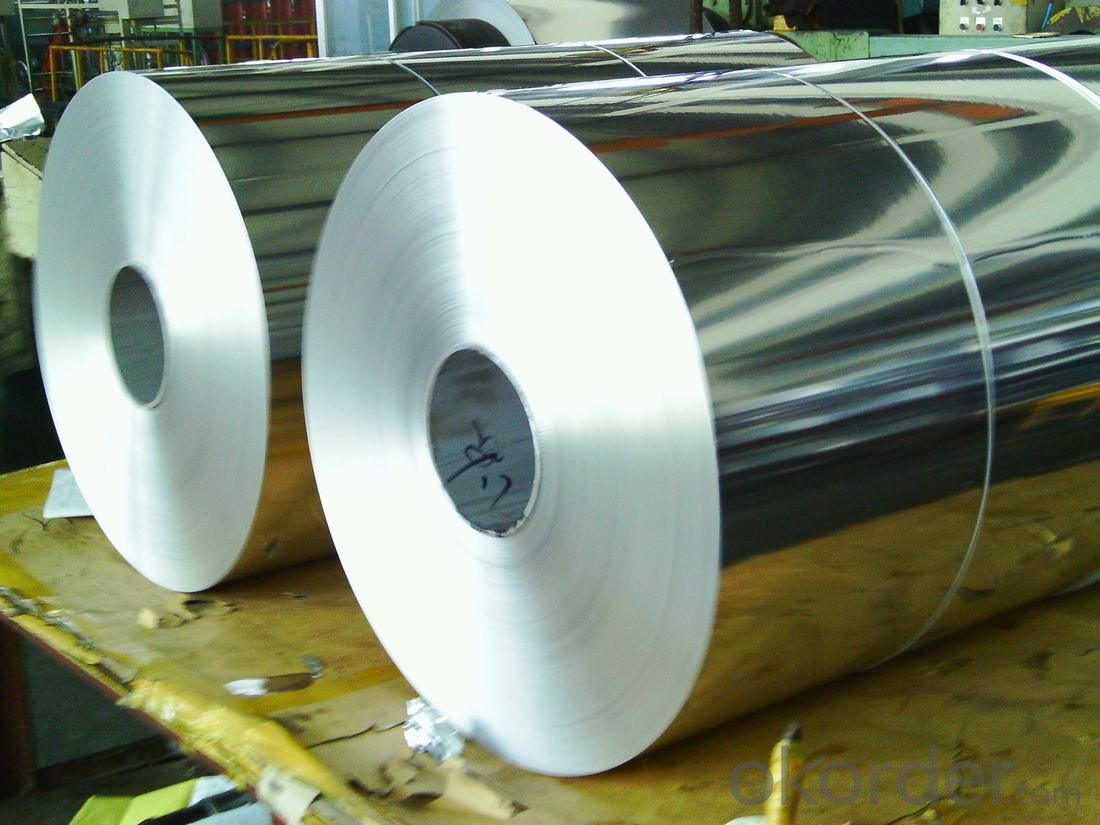
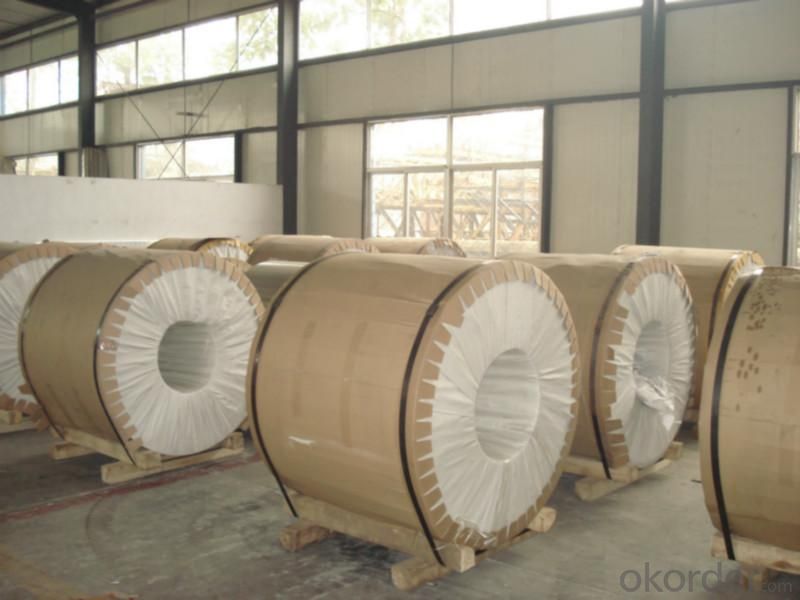
- Q: Can aluminum coils be used in packaging industries?
- Yes, aluminum coils can be used in packaging industries. Aluminum is lightweight, flexible, and has excellent barrier properties that protect the packaged products from moisture, oxygen, and light. It is commonly used for packaging food, beverages, pharmaceuticals, and other consumer goods due to its durability and ability to preserve product quality.
- Q: Is anodized aluminum suitable for indefinite salt-water exposure or will it rust? Also note that it would be used for the hull of a boat (more like a platform), and if it is not suitable could you suggest another metal?
- Aluminum would be an ideal material stainless steel a better one, aluminum does not rust it deteriorates to electrolite when in contact with salt water and a magnetic or ferrus metal. Therefore as long as your boat is fitted with salt water anodes it should create no problems if not it will deteriorate rapidly in salt water. All powered salt water craft/vessels carry anodes ie there is an anode fitted to the aluminum drive leg of an outboard or Z drive if intended for salt water use, On larger ships the anodes are normally fixed to the rudder blade so equip your platform the same. Zink anodes are cheap and available at every salt water chandlers. You should also use non ferrus bolts and screws to screw your construction together with, or to fix it to the hull, or better make a set of jigs to suit shape size and then get it TIG welded never mix ferrus and non ferrus metals in the presence of salt water without a zink anode, the damage is rapid and attacks the structure of the non ferrus metal creating an electric field and destroying the weakest current catalyst ie the aluminum itself. The non ferrus metals that in general maritime use that are are not so much effected by salt water are phosphor bronze, brass,and copper.Non of these would be suitable for making your platform, therefore aluminum. If weight is not a problem though i would recommend a middle grade stainless steel such as se 80 or around that grade, And again it would be better to be TIG welded than bolted together, bolts are subject to movement (especially at sea) and therefore hole enlargement. As are safety standard pop rivets.
- Q: What is the typical heat transfer coefficient for aluminum coils?
- The heat transfer coefficient for aluminum coils can vary depending on several factors, including the application, coil geometry, and surrounding conditions. Generally, aluminum has high thermal conductivity, which enables efficient heat conduction. In forced convection applications, where heat is transferred using a fluid like air or water, the heat transfer coefficient for aluminum coils can range from 10 to 100 W/m^2K. This range is influenced by factors such as flow rate, velocity, and temperature difference between the coil and the fluid. In natural convection scenarios, where heat transfer occurs due to the buoyancy-driven flow of air, the heat transfer coefficient for aluminum coils is typically lower, ranging from 5 to 25 W/m^2K. This is because the movement of air is slower and the heat transfer effectiveness is reduced compared to forced convection. It's important to note that these values are general guidelines and can vary significantly depending on specific design considerations, material properties, and operating conditions. Therefore, it is recommended to consult specific heat transfer data or conduct detailed experiments or simulations to determine the precise heat transfer coefficient for a given aluminum coil application.
- Q: What are the different surface finishes available for aluminum coils?
- There are several different surface finishes available for aluminum coils, including mill finish, brushed finish, embossed finish, anodized finish, and painted finish.
- Q: Are there any limitations or restrictions on the use of aluminum coils?
- Yes, there are limitations and restrictions on the use of aluminum coils. Some of the limitations include the maximum operating temperature, which is typically lower compared to other metals, such as copper. Aluminum coils may also have lower electrical conductivity, making them unsuitable for certain applications that require high conductivity. Additionally, the corrosion resistance of aluminum coils can be compromised in certain environments, necessitating protective coatings or alternative materials. Lastly, the strength and durability of aluminum coils may be lower compared to other materials, which may limit their use in certain high-stress applications.
- Q: Are aluminum coils suitable for heat sinks?
- Yes, aluminum coils are suitable for heat sinks. Aluminum is a popular choice for heat sinks due to its excellent thermal conductivity and low cost. The high thermal conductivity of aluminum allows it to efficiently transfer heat away from a heat source towards the fins of the heat sink, where it can be dissipated into the surrounding environment. Additionally, aluminum is lightweight and easily formed into various shapes, making it a versatile material for heat sink applications. Overall, aluminum coils are a suitable choice for heat sinks, providing effective heat dissipation and cost-effectiveness.
- Q: Can aluminum coils be used in the production of automotive heat shields?
- Yes, aluminum coils can be used in the production of automotive heat shields. Aluminum is commonly used in heat shields due to its excellent thermal conductivity and lightweight properties. It helps to effectively dissipate and reflect heat, making it a suitable material for this application.
- Q: What are the different protective film options for aluminum coils?
- Aluminum coils have a range of protective film options available, each with its own benefits and suitability for different applications. Some commonly used options include: 1. PVC Film: These films are highly resistant to moisture, chemicals, and abrasion, making them a popular choice for protecting aluminum coils. They offer excellent surface protection and come in various thicknesses and adhesive strengths. 2. PE Film: Another popular choice, PE films provide good resistance to moisture and UV radiation. They are generally more cost-effective than PVC films and are available in different grades, such as LDPE and LLDPE. 3. PP Film: Known for their tear resistance and high tensile strength, PP films are ideal for applications where coils may undergo rough handling or transportation. They offer good protection against mechanical damage. 4. PET Film: PET films offer exceptional clarity and transparency, making them perfect for applications that require visual inspection of the coils. They also provide good resistance to heat, chemicals, and abrasion. 5. Adhesive Coatings: In addition to films, adhesive coatings can be used to protect aluminum coils. These coatings are directly applied to the coil's surface and create a protective layer against moisture, corrosion, and scratching. When choosing a protective film for aluminum coils, it is crucial to consider factors such as the intended application, environmental conditions, handling processes, and desired level of protection. Seeking guidance from a supplier or manufacturer can help determine the most suitable option for specific requirements.
- Q: Are aluminum coils suitable for architectural sunshades?
- Yes, aluminum coils are suitable for architectural sunshades. Aluminum is a popular material choice for sunshades due to its lightweight nature, durability, and corrosion resistance. Aluminum coils can be used to create various shapes and designs for sunshades, allowing for flexibility in architectural design. Additionally, aluminum can be easily fabricated and installed, making it a practical choice for architectural projects. Furthermore, aluminum has excellent thermal properties, allowing it to effectively reflect heat and reduce solar gain, which can help improve energy efficiency in buildings. Overall, aluminum coils are a suitable and versatile option for architectural sunshades.
- Q: How can you tell the difference between aluminum and other non-magnetic metals, such as what I've heard called, pot-metal?
- Aluminum is very light. Pot metal, also known as white metal, die-cast zinc, or monkey metal,[1] is a slang term that refers to alloys that consist of inexpensive, low-melting point metals used to make fast, inexpensive castings. There is no scientific metallurgical standard for pot metal; common metals in pot metal include zinc, lead, copper, tin, magnesium, aluminium, iron, and cadmium. The primary advantage of pot metal is that it is quick and easy to cast. Due to its low melting temperature no sophisticated foundry equipment is needed and specialized molds are not necessary. It is sometimes used to experiment with molds and ideas before using metals of higher quality. Examples of items created from pot metal include toys, furniture fittings, tool parts, electronics components, and automotive parts.[citation needed] Pot metal can be prone to instability over time, as it has a tendency to bend, distort, crack, shatter, and pit with age.[1] The low boiling point of zinc and the fast cooling of the newly-cast part often allow air bubbles to remain within the cast part, weakening the metal.[1] Many of the components of pot metal are susceptible to corrosion from airborne acids and other contaminants, and the internal corrosion of the metal often causes the decorative plating to flake off.[citation needed] Pot metal is not easily glued, soldered or welded.[1] At one time, pot metal referred to a copper alloy that was primarily alloyed with lead. 67% Cu, 29% Pb 4% Sb and 80% Cu, 20% Pb were common formulations.[2] The primary component of pot metal is zinc, but often the caster adds other metals to the mix to strengthen the cast part, improve the flow of the molten metal, or to reduce cost.[dubious – discuss] With a low melting point of 419 °C (786 °F), zinc is often alloyed with other metals including lead, tin, aluminium and copper.
Send your message to us
6063 Alloy H22 Aluminum Rolled Sheet Aluminium Coil - Aluminum Coil Slitting Machine
- Loading Port:
- Shanghai
- Payment Terms:
- TT OR LC
- Min Order Qty:
- 5 m.t.
- Supply Capability:
- 500 m.t./month
OKorder Service Pledge
OKorder Financial Service
Similar products
Hot products
Hot Searches
Related keywords
